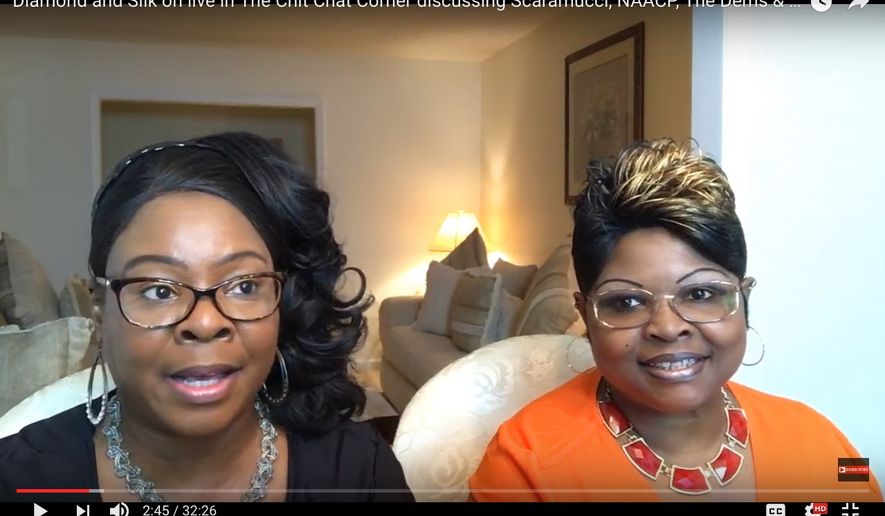Diamond and Silk, two black women who have garnered a large social media following from their support for President Trump, told Congress Thursday that they think Facebook’s algorithms are biased against them.
The women, whose real names are Lynnette Hardaway and Rochelle Richardson, said they asked Facebook about the problems they were having and were told their content was “unsafe.”
The company later walked back that claim, saying that was an “enforcement error” and they were trying to work it out — but the women, and Republican lawmakers, say it’s another example of a social media giant censoring conservative viewpoints.
“What I find appalling is these Democrats don’t want to take up for our voice because we support the president,” Ms. Hardaway told the House Judiciary.
Their appearance before the committee was deeply divisive, with Democrats saying the GOP was giving the women an unwarranted attention.
“We’re giving you a tremendous platform with this hearing to make a ton of money when it’s over,” said Rep. Hank Johnson, Georgia Democrat.
“I’m just astounded that this committee would stoop to this level to be positioning you all to make more money,” he added.
The women accused him of attempting censorship himself. “You’re not going to brush us off like we don’t have merit here,” said Ms. Hardaway.
Ms. Richardson also told the committee that YouTube demonetized their videos, meaning they can no longer earn ad revenue from their posts to that platform.
The hearing was called to examine the filtering practices of social media companies, with an emphasis on censorship regarding conservative groups or figures. Chairman Bob Goodlatte said he had invited Google, Facebook and Twitter to testify but they all declined. “Their refusal to appear only creates more questions and more concerns,” the Virginia Republican, said.
Democrats were visibly frustrated by the hearing and expressed their anger at the majority for even holding the hearing calling conservative censorship on social media a “hoax.”
“The censorship argument, the central thesis of this hearing, doesn’t hold up under even the most basic scrutiny,” said Rep. Jerry Nadler, New York Democrat.
Other Democrats on the committee commented that a better use of time would have been to discuss Russia’s use of social media and how to prevent future meddling in the upcoming midterm races.
While a professor, a representative of the Electronic Frontier Foundation and newspaper trade association CEO were also at the witness table, Ms. Richardson and Ms. Hardaway dominated the proceedings.
Reps. Hakeem Jeffries and Shiela Jackson Lee questioned them about a $1,274.94 payment the Trump campaign showed it made to them in November 2016. The payment was reported on Federal Election Commission filings, where the campaign said it was for “field consulting.”
Both women say they were never paid by the campaign.
Ms. Richardson said the campaign paid the money to them as a refund for airplane tickets they’d bought to attend an event.
Their response was confirmed by Trump campaign treasurer Bradley Crate, who said it was an issue of “semantics.”
“The invoice was not supported by accompanying receipts, so as a technical matter, could not be reported as a reimbursement even though its purpose was to make them whole for their out-of-pocket costs,” Mr. Crate said in a statement.
• Sally Persons can be reached at spersons@washingtontimes.com.




Please read our comment policy before commenting.